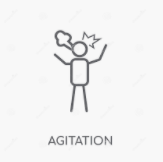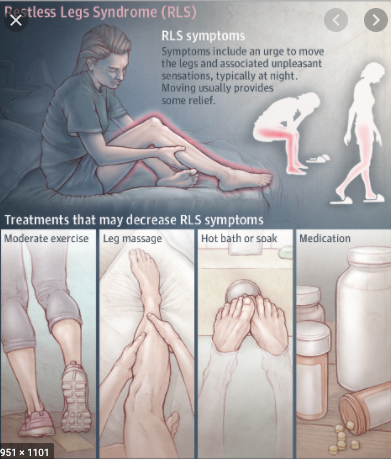Agitation
What is agitation?

Agitation is a sense of inner tension and uneasiness. When experiencing agitation, you may feel the need to move around or may become annoyed with your those around you. Agitation is not an illness, but can be a symptom of a mood disorder (like depression) or a medical condition. It is a normal emotion. But it is more likely to show up when you’re under a lot of stress. It can also happen if you use drugs or alcohol.
What causes agitation?
Agitation is a normal emotion that you can experience at any point in your life. In the majority of cases, there is no need for worry or concern. Agitation can be experienced more often if you are living with a health condition, like cirrhosis.
Sometimes a medical condition can cause agitation. It’s pretty common to feel unsettled if you have hormone problems or are struggling with a psychological condition like schizophrenia or substance use disorder. There are other causes of agitation, that’s why it is important to talk to your doctor if you get agitated, especially if you feel like it is for no reason.
For people living with cirrhosis, agitation can be caused by:
- Waste products: If your liver is not working properly, toxins can build up in your body and affect your brain and mood.
- Medicine: Some medications may cause you to feel moody or short-tempered
- Stress caused by your chronic illness. Living with a chronic disease is stressful. Strong emotions can come from feeling hopeless or nervous about having a life threatening disease.
How are causes of agitation diagnosed?
Your doctor will talk to you about your agitation and will ask questions about your medical history, your lifestyle, and any other concerns you may have. Your doctor may also refer you to a mental health professional (psychologist, psychiatrist, therapist, counselor, etc.) for further support.
Symptoms of agitation:
- feeling uneasy
- having an urge to move, often with no purpose
- feeling ‘cranky’ or short tempered
- being less patient than normal
- feeling nervous with no explanation
- unexplained and excessive excitement
Treating agitation
Treating your agitation will depend on your current health status. Below are some general tips you can try to relieve agitation:
- Deep breathing exercises
- When breathing in (inhaling) pretend that you are smelling flowers. When breathing out (exhaling) pretend that you are blowing out birthday candles.
- Yoga or meditation
- Exercise (walking, running, swimming) or simple stretches
- Trying to identify situations, people, or things that cause you stress and limit your contact with them
- Using technology
- Applications like Calm or Headspace provide simple guides to promote mindfulness and relaxation
- Problem solving
- Often problems are very real and unavoidable. For example, you have liver disease and need routine medications and procedures to sustain your life which you have little control over. When you meet a challenge that can be changed, like improving lab values, make a plan to solve it and mark your progress along the way. Ask for assistance from a healthcare team member, such as a dietitian who can help you discover ways to change your diet and improve these values.
- Use humor
- Staying positive and finding the humor in life, especially during treatment for liver disease, will help you remain relaxed and handle stress better.
- Watch funny movies or tell funny stories to fill your time with positive thoughts instead of negative thoughts.
- Change your environment
- Surround yourself with calm, uplifting people. When possible, avoid people or situations that tend to agitate you.
- Bring an uplifting book, calming playlist or other means of distraction with you to your appointments
- Talk with your family and friends
If these techniques do not work to reduce the stress you are experiencing, your health care provider may refer you to a mental health professional for further support.
Mental Health conditions
If you have been diagnosed with anxiety, depression or another mood disorder, your doctor may recommend medications, therapy, or a combination of both to manage it.
Restlessness
What is restlessness?
Restlessness is a sensation where you feel you are unable to rest or relax. It has many different causes, including anxiety and boredom, and can be experienced in different ways. For some people they become restless in stressful situations, like tests and doctors appointments. For others they become restless when they are trying to sleep. For patients living with chronic liver disease, restlessness is most often felt as restlessness leg syndrome.
Restless Leg Syndrome

Restless Leg Syndrome is a condition that causes you to move your legs uncontrollably, usually because of an uncomfortable feeling or sensation. It usually happens at night when you’re sitting or lying down. Moving tends to relieve the pain or uncomfortable feeling.
Symptoms
The main symptom is having the urge to move your legs. Other things that may happen include:
- Worsening of symptoms at night
- Nighttime leg twitching. Restless leg syndrome may be accompanied by limb movements during sleep. This is when your legs twitch and kick while you sleep
Causes
- Family history. Sometimes the syndrome runs in families
- Pregnancy
- Chronic disease. Chronic diseases like cirrhosis may make you more likely to develop restless leg syndrome
Diagnosing Restless Leg Syndrome
Your doctor will take your medical history and ask for a description of your symptoms.
Treating Restless Leg Syndrome
Depending on the cause and the impact of restless leg syndrome on your life, your doctor may recommend different things.
- Medications. Your doctor may prescribe different medications including those that affect dopamine and calcium. Because most of these medications are broken down by your liver, it is important to talk to your doctor before taking them.
Things you can try:
- A warm bath
- Massaging your legs
- Apply heat or ice packs, making sure to always put a cloth between your skin and the source of heat or cold
- Establish a sleep schedule and routine.
- Exercise. Try to exercise regularly.
- Avoid alcohol and illicit substances.
- Try to cut back/avoid caffeine and nicotine.
When to see a doctor
Many people with restless leg syndrome never seek help. It is important to talk with your doctor if you are experiencing restless leg syndrome because it can interfere with your sleep and affect your quality of life.
Important Resources
Canadian Liver Foundation Patient Support
Depression and Bipolar Support Alliance: Understanding Agitation
